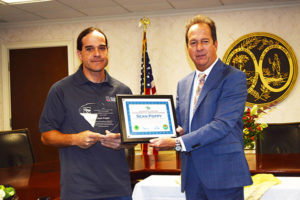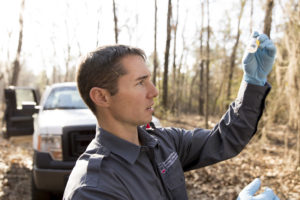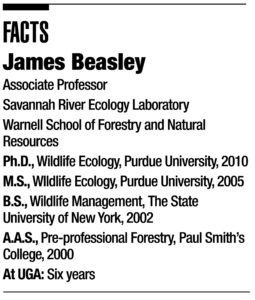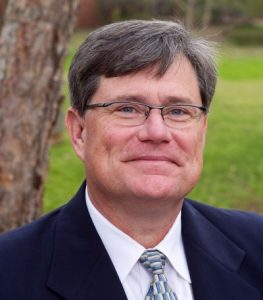NSF grant funds research on epigenetics
The three-year, $572,000 grant will allow an SREL research team to study the effects of temperature on alligators’ reproductive development.
The three-year, $572,000 grant will allow an SREL research team to study the effects of temperature on alligators’ reproductive development.
Dec. 4, 2018

Sean Poppy, outreach program coordinator at the University of Georgia’s Savannah River Ecology Laboratory, has been awarded the South Carolina Environmental Awareness Award.
David Wilson, the acting director of the S.C. Department of Health and Environmental Control, presented the award to Poppy at a recent ceremony in Columbia, South Carolina.
Established in 1992 by the South Carolina General Assembly, the award recognizes outstanding contributions made toward the protection, conservation and improvement of the state’s natural resources. An awards committee comprised of representatives from South Carolina’s natural resource agencies reviews nominations that are submitted from the public.
The committee considers innovation, leadership and accomplishments that influence positive changes that affect the natural environment.
Poppy conducts more than 300 presentations a year that educate the public on the natural ecosystems of South Carolina and Georgia, including wildlife. His animal-featured presentations reach close to 40,000 individuals, including students and K-12 educators.
A 20-year employee of the SREL, Poppy has held several positions at the laboratory, including research technician and education program specialist.
He earned a bachelor’s of science degree in biology from the University of South Carolina.
Media Contact: Vicky L. Sutton-Jackson, 803-725-2752, vsuttonj@srel.uga.edu
I n teaching the concepts of wildlife ecology, James Beasley covers a lot of ground both literally and figuratively.
n teaching the concepts of wildlife ecology, James Beasley covers a lot of ground both literally and figuratively.
Based at the U.S. Department of Energy’s 310-square-mile Savannah River Site near Aiken, South Carolina, Beasley gives advanced hands-on instruction to students investigating the conditions of wildlife and their behavior.
“I spend a lot of time in the field mentoring students,” said Beasley, who also is a faculty member in the Warnell School of Forestry and Natural Resources. “Handling large mammals requires a great deal of oversight and training in trapping techniques, administering anesthetics and handling animals after capture.”
Currently, he teaches an online class in basic wildlife ecology for nonmajors and a Maymester class that exposes students to lab and field work on the SRS.
He balances teaching at the SRS with travel to foreign landscapes where he investigates the effects of radiation fallout on wildlife. 
Beasley supervises individual teams of graduate students who conduct research in the field in Fukushima, Japan, and in the Chernobyl Exclusion Zone.
The research in Chernobyl is conducted in an 834-square-mile ecological reserve in Belarus. Students study population dynamics, movements and health of large mammals, including gray wolves. As part of this research, Beasley helped develop a tool that combines an electronic dosimeter with a GPS tracking collar. It can capture an animal’s movement and exposure to radiation in close to real time.
Despite the presence of radioactive chemicals on the landscape, Beasley’s team determined that abundant populations of wildlife exist in the CEZ. He cautioned that the results of the study do not necessarily indicate that these wildlife are healthy.
“It opens our eyes to the effect of humans on large mammals—deer, moose and wolves,” said Beasley. “It is an extreme example, but it brings to light that human presence on a landscape disrupts the natural environment.”
Beasley began the studies in Japan after he was asked to serve as the International Atomic Energy Agency’s wildlife adviser to the Fukushima Prefecture government in 2014.
“In Fukushima, we work throughout the human exclusion zone as well as a large, surrounding control area inhabited by people,” Beasley said.
Although his research studying radioactive elements in the environment has garnered much attention, Beasley is quick to point out that other areas of his research are equally important.
“Within my lab, we also conduct research on the management of carnivores, invasive species and their impacts on natural ecosystems,” said Beasley. “A lot of this research has focused on the management of invasive wild pigs.”
His expertise in this area is evident. He heads a national subcommittee that developed recommendations for managing the invasive wild pig population.
During his time at UGA, Beasley has quickly risen from an assistant research scientist to a tenured position. This achievement came on the heels of him being named the 2018 Fred C. Davison Early Career Scholar. The award is given to an individual who has demonstrated outstanding accomplishment and in short, demonstrates the potential for achieving future success.
Beasley said he enjoys what he’s doing and where he’s doing it.
“I knew that I wanted to work outside in either forestry, fisheries or wildlife because I grew up in the country hiking, fishing and hunting,” Beasley said. “I’ve always been drawn to the outdoors.”
Prior to coming to UGA, Beasley was a visiting assistant professor at Purdue University. When asked if he prefers research or teaching, Beasley said he enjoys both.
“That’s why I am at a school like Georgia,” Beasley said. “In fact, most of my research is done with graduate students, so mentoring, which I view as teaching, is a big part of that research. I suppose you can say that I am passionate about experiential learning.”
Rebecca R. “Becky” Sharitz, former professor of plant biology and senior research ecologist at the UGA’s Savannah River Ecology Laboratory, died Oct. 20 at her home in Aiken, South Carolina.
A native of Virginia, Sharitz joined the UGA faculty at SREL in 1972 and later served as acting director of the laboratory. She was also an adjunct faculty member in the Odum School of Ecology until 2017. Her faculty affiliation with the ecology school dates back to its previous history when it was known as the Institute of Ecology.
She was recognized internationally for her research in wetlands ecology and was author of a dozen books, including textbooks on freshwater and estuarine wetlands. She received the National Wetlands Award in Science Research from the Environmental Law Institute and was elected Fellow of the Society of Wetland Scientists and the Ecological Society of America, for which she served as national vice-president. She was president of the Association of Southeastern Biologists and vice-president and member of the executive board of the International Association for Ecology.
As major professor and mentor to numerous graduate students during her career, Becky Sharitz was considered to be the quintessential role model in the field of ecology, both professionally and personally.
The results from the study, published in the journal Biology of Reproduction, indicate that the element of time is an essential factor.
The gallery will depict the ongoing roles that both the University of Georgia’s Savannah River Ecology Laboratory and the USDA Forest Service-Savannah River have had in the environmental stewardship of the U.S. Department of Energy’s Savannah River Site since 1951.
 Aiken, S.C. – Olin E. Rhodes, Jr., director of the University of Georgia’s Savannah River Ecology Laboratory and professor in the Odum School of Ecology, has been named the 2018 recipient of the Caesar Kleberg Award for Excellence in Applied Wildlife Research. The annual award is given by The Wildlife Society in honor of the late Texas conservationist Caesar Kleberg.
Aiken, S.C. – Olin E. Rhodes, Jr., director of the University of Georgia’s Savannah River Ecology Laboratory and professor in the Odum School of Ecology, has been named the 2018 recipient of the Caesar Kleberg Award for Excellence in Applied Wildlife Research. The annual award is given by The Wildlife Society in honor of the late Texas conservationist Caesar Kleberg.
TWS defines the award as recognizing those who have distinguished themselves in applied research and whose body of work, in both inquiry and discovery, has resulted in application of management and conservation on the ground.
Rhodes’ research has focused on wildlife ecology and genetics, including the genetic consequences of species reintroduction programs, the use of genetic tools for addressing issues of wildlife management and conservation, disease ecology and the sustainability of wildlife species in human-dominated landscapes, to name a few.
He has published over 200 peer-reviewed journal articles, books and chapters. His previous awards and recognitions include The Wildlife Society Fellow, 2015; TWS Professional Award of Merit, 2008; and the Hoosier Wildlife Award, 2007.
Rhodes previously served as assistant director of the National Wildlife Research Center, a branch of the U.S. Department of Agriculture’s Animal and Plant Health Inspection Service in Fort Collins, Colorado. In this role he supervised over 170 research scientists and technicians working in the areas of wildlife diseases, invasive species and human-wildlife interactions in agricultural ecosystems.
Prior to the position with USDA, Rhodes was a professor in the Department of Forestry and Natural Resources at Purdue University. He also served as director of Purdue’s Interdisciplinary Center for Ecological Sustainability.
Rhodes received a doctorate degree in wildlife ecology from Texas Tech University and a master’s degree from Clemson University.
The award, which includes a medal and monetary gift, was given at TWS’ recent 25th Annual Conference in Cleveland, Ohio.
Contact: Vicky L. Sutton-Jackson, 803-725-2752, vsuttonj@srel.uga.edu.
###
“…Our focus is to help people understand the process, and use the data from their community to help them understand the larger picture.”
Despite predation risks at the release site, survival rates were higher than survival reported for their wild counterparts, according to Quinn, a graduate student at SREL and Warnell during the research.
SREL helped in winning this grant for Allendale by offering to provide its existing education outreach programs for Allendale students,” Mets said.